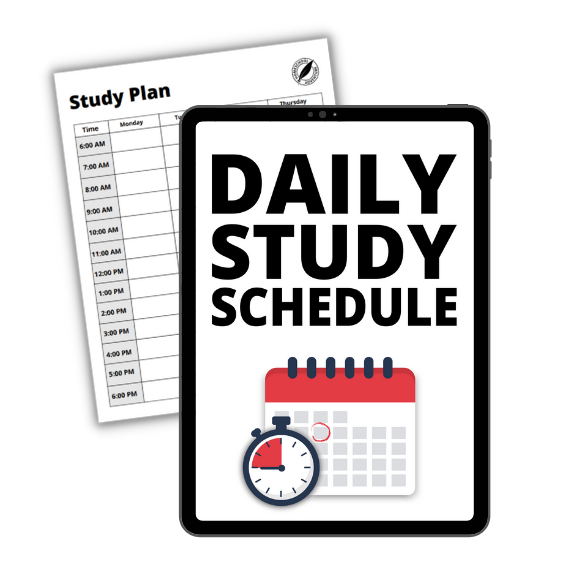In trying to create a study schedule, many students wonder how long a study session should be.
They’re not sure how much they should study in one sitting to make the most effective use of their time.
The answer isn’t straightforward as the “ideal” study session varies from person to person.
So today, I’d like to discuss ways to make your study sessions work best for you and your students.
Maximize Study Time with This Daily Schedule
Experience the power of time blocks for study sessions. This printable tool makes it easy!
The Case for Short vs. Long Study Sessions
Study-session timing is largely dependent on your schedule, learning style, type of material, and ultimately, your goals.
(Goal-setting is an important part of studying and one of the 10 strategic habits we teach).
For instance, if you are easily bored or distracted, you may need to study in shorter bursts.
Likewise, shorter study sessions may be best when the material you’re studying is overwhelming or centered around a difficult concept.
However, if you’re someone who prefers to just “get it done,” then larger time blocks may work best.
No matter what your study style is, consider capping your maximum hours of study per day at 6 hours.
Bear in mind that is the upper limit—burnout awaits beyond.
Speaking of burnout, brain fatigue is very real, which brings me to my next point.
Identify How Long You Can Study in One Sitting Before Your Brain Gets Tired
The best way to determine how many minutes at a time you should study is to check in with yourself after specific intervals.
To perform this check-in and identify your optimal study time, use a timer and evaluate your thinking at different intervals—15 minutes, 30 minutes, 1 hour, and so on.
Note what you’re doing and how you’re feeling when the timer sounds:
- Are you retaining information?
- Are you rereading the same sentence over and over?
- Are you staring off into space?
There is a limit to how long you can study efficiently, and it will vary based on the factors mentioned above.
Determine How Long Your Study Sessions Should Be by Your Personality Type
In addition to cognitive stamina, you should factor in your nature when determining how many hours you should (or can) study per day.
Don’t forget breaks—they are needed and worthwhile.
In light of that fact, it is helpful to ask yourself, “How should I space out my daily study sessions to maximize their effectiveness?”
Your individual personality type should guide you in choosing shorter or longer study sessions.
Work Best in Short Bursts? Try 30 Minute Sessions
If you need to allow information to “settle” in your mind, you may want to stick to short bursts of studying.
Try 30-minute study sessions followed by 10-minute breaks.
This style is similar to the Pomodoro method, which recommends short study periods followed by very short breaks.
Studying in short bursts also works well if you get overwhelmed by larger tasks and tend to procrastinate.
Shorter study sessions help eliminate overwhelm—and the procrastination caused by it.
Are You a Long Hauler? Try 2-3 Hour Time Blocks
However, some students dislike the idea of breaking up their study times throughout the day.
The idea of short breaks every 30 minutes is irritating and feels like a waste of time.
Such students would rather buckle down and just get it over with. They typically know how to study for long hours and can block out distractions.
If I just described you, try working 2 to 3 hours at a time with 30-minute breaks.
It’s enough time to make significant progress while giving your brain the rest it needs.
Thrive at Night with No Distractions? Try a 1:1 Study Ratio
Speaking of distractions, night owls have the advantage when it comes to interruptions. The busyness of the day has passed and quietness fills its place.
With the calm that a nighttime environment affords, it’s possible (and in many cases beneficial) to achieve a 1:1 study ratio.
Basically, you study for the same amount of time that it takes to complete the given lesson.
For instance, if your history lesson takes 1 hour per day, spend 1 hour per day studying history.
Early Riser? Try a 2:1 Study Ratio
Early birds may need to study a little more given that daytime distractions can be unpredictable.
If you find it hard to focus or want to ensure your studying gets done, try a 2:1 study ratio.
For example, if you do chemistry for 30 minutes, 3 days per week, then study chemistry for 1 hour, 3 days per week.
A 2:1 ratio gives you more time to evaluate information and retain it by quizzing yourself as you go.
As such, this ratio is particularly helpful if you’re trying to figure out how long to study for a test.
Tips for Maximizing Your Study Time Each Day
Most universities recommend studying 1-3 hours per each hour spent in class.
No matter how much time you spend studying, it’s important to make the most of that time.
Try these tips to help you study efficiently.
1. Avoid Multitasking
When you have a lot of material to review and a limited amount of time to work, you may need to study in bursts.
The key to studying in 1 hour or less is focus.
Multitasking may be a productivity hack for some people, but it’s actually an ineffective study habit.
Find a quiet place or put in earbuds, limit distractions, and turn off your phone.
2. Quiz Yourself Often
To help you recall the most critical points, spend a few minutes during each study session quizzing yourself on what you just read.
Flashcards are ideal for self-quizzes, but you can also have someone in your family ask you questions from the material.
3. Study in a Variety of Ways
It can be very helpful to “mix things up” when you’re studying. Alternating study methods helps keep you engaged and protects against boredom.
For instance, alternate between reading new information, reviewing notes, and quizzing yourself.
It may also be helpful to move around and study in different places.
4. Keep Your Materials Organized
You don’t want to waste the valuable time you’ve set aside to study by looking for misplaced notes.
The best way to study faster is to stay as organized as possible.
Find a system to organize your notetaking and be consistent when you name and store electronic notes.
It’s also helpful to keep related paperwork in one place separated by subject.
The Ideal Length of a Study Session
To determine how long you can study before taking a break, experiment with various intervals to see what works best for you.
Many people suggest 1-hour sessions followed by 10-minute breaks, so that’s a good place to start.
If you find yourself distracted or antsy after an hour of working nonstop, perhaps a 30-minute session followed by a 5-minute break would work better.
If you’re still fresh and focused after an hour, try studying in larger chunks.
Ultimately, your personal study session length will depend on your personality type, your schedule, and your goals for each session.
The most important thing to learn is how to maximize your study time:


